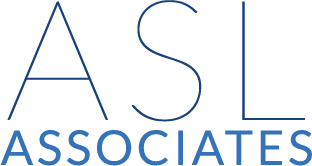IMPORTANT UPDATE/REMOTE INTERPRETING AVAILABLE:
In response to COVID-19 concerns; ASL Associates has provided each of our staff with the ability to interpret remotely. If your business has concerns about the number of individuals physically present at an appointment/ meeting, we are happy to provide remote interpreting for all ADA Appropriate situations. Contact us below for any questions you may have.
Interpreter Credentials
Many of the Interpreter Training Programs offer two-year associate degrees, bachelors, and master’s degrees in interpreting. Holding a degree is a prerequisite for RID certification.
However, like many other professions, appropriate credentials can be a useful indication of an interpreter’s qualifications.
The Registry of Interpreters of the Deaf (RID) and the National Association of the Deaf (NAD) certify interpreters based on interpreting skill level. The RID certification test requires interpreters to demonstrate their skills and knowledge regarding language, communication, the interpreting process, ethics, culture and professionalism. RID tests include a written test and a performance test. Alternately, an NAD certification test required interpreters to demonstrate their interpreting skills and knowledge of ethics through a performance test which encompasses an interview.
The Registry of Interpreters of the Deaf (RID) has just announced that they are making testing changes and should be announcing these changes in November of 2015. Once we are aware of these change we will update this information on our page.
RID Code of Professional Conduct
The Registry of Interpreters for the Deaf, Inc. has set forth the following principles of ethical behavior to protect and guide interpreters and transliterators, and hearing and deaf consumers. Underlying these principles is the desire to ensure for all the right to communicate.
- Interpreters adhere to standards of confidential communication.
- Interpreters possess the professional skills and knowledge required for the specific interpreting situation.
- Interpreters conduct themselves in a manner appropriate to the specific interpreting situation.
- Interpreters demonstrate respect for consumers.
- Interpreters demonstrate respect for colleagues, interns, and students of the profession.
- Interpreters maintain ethical business practices.
- Interpreters engage in professional development.
- Interpreters by virtue of membership or certification by the RID, Inc., shall strive to maintain high professional
standards in compliance with the Code of Professional Conduct.
Common RID certifications include:
- CI Certificate of Interpretation
- CT Certificate of Transliteration
- CDI Certified Deaf Interpreter
- OTC Oral Transliteration Certificate
- SC:L Specialist Certificate: Legal
- CSC Comprehensive Skills Certificate
- IC Interpretation Certificate
Common NAD certifications are:
- III Generalist Interpreter
- IV Advanced Interpreter
- V Master Interpreter
Their new NAD/RID joint interpreter certification exam is called the National Interpreter Certification (NIC) and contains three (3) levels:
- NIC: Certified
- NIC: Advanced
- NIC: Master
All certified interpreters (NAD and RID) must continue their skill development through the RID Certification Maintenance Program (CMP). To retain certification, interpreters must earn eight (8.0) Continuing Education Units (CEUs) (80 hours of documented professional development experiences) within four years.

